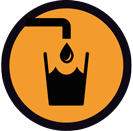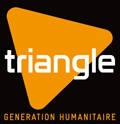AREA OF EXPERTISE

Water, hygiene and sanitation

AREA OF EXPERTISE

Water, hygiene and sanitation
FUNDING
Beneficiaries: 1063 vulnerable, disabled or aged people belonging to one these three “categories”:
Specific aim of programme
Improve the living and hygiene conditions of a number of disabled or aged Sahawari refugees in the Aoussert, El Aioun, Dakhla, Smara and "27 February" camps.
Country and region(s) of implementation:
ALGERIA, South of Tindouf, Sahawari refugee camps: Aoussert, El Aioun, Dakhla, Smara and "27 February".
General context
The arrival of Sahawari refugees in 1975-76, in the Tindouf region, gave rise to the creation of four main
" camps " grouping all the refugees.
Presence of water and security dictated the refugees " settlement " in the camps (these were spread over a maximum range of 170 kilometres around Tindouf).
By order of demographic importance, the camps are: El Ayoun, Smara, Aoussert and Dakhla.
Situation of people with special needs
Almost ten decades of exile, extremely precarious conditions, lack of medical care and knowledge about disability created a situation of distress and vulnerability that impacted the entire range of people. The Sahawari authorities and various partners working in this sector had made efforts to improve the situation:
However, such recognition barely affected the most vulnerable (bed-ridden, polyhandicapped, very weak elderly people, etc.) because of the scarcity of specialised equipment.
When Triangle first started working in the camps, people with special needs represented the most vulnerable category of the Sahawari population in refuge.
Although aid was provided to the institutions taking care of disabled people (mainly children), disabled adults or families with a disabled member only benefited from punctual aid.
People with special needs had been living in the camps for almost 30 years; the effects of the humanitarian crisis on their lives was sorely felt.
Disabled and elderly people, living in a harsh environment and suffering multiple constraints, seemed to be crying out for solidarity. Help was essential. Appropriate equipment meeting their needs was essential.
The identification phase described above was fundamental to achieve this project.
With the help of employees from the Ministère de l'Action Social and the Promotion de la Femme (MASPM) at national and local levels, using tools designed to optimise collection and storage of information, Triangle defined the needs of each beneficiary by visiting the homes of every disabled or vulnerable elderly person in the refugge camps of Sahawari, south of Tindouf.
Assignment of daily work
With every daîra counting 4 districts, each team had to identify the beneficiaries and their needs in two districts.
The tools
Individual identification cards: these concerned each person (status, address, special need, level of autonomy),
and helped us precisely define the equipment they required.
Database containing all the fields of the Id cards: to simplify storage and analysis of the data collected during individual meetings.
The visits
Social workers had the task of selecting the beneficiaries to meet.
Criteria
Our aim was to identify the precise needs of potential beneficiaries along with the type of equipment to supply. We based our selection on criteria established by Triangle's teams:
Home visits
To gather the most specific information and establish precise exact needs we met the potential beneficiaries in their homes.
For each potential beneficiary, our teams filled in the identification card and, with the person's consent, took a photo of them.